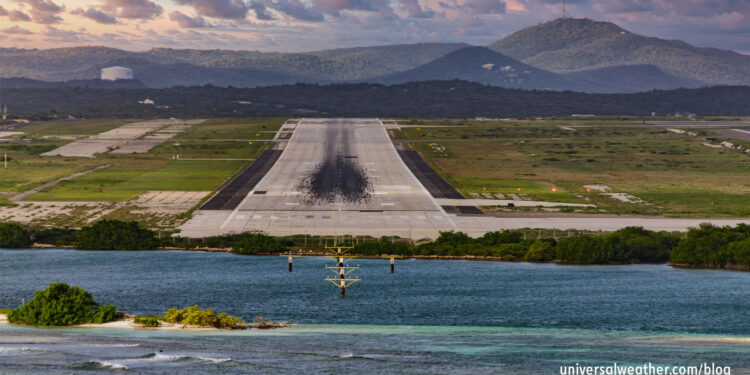Business Aircraft Operations to Aruba: Airport Ops

This is a post by author Claudio Stamper. At the time of its writing, Claudio served as general manager for Universal Aviation Aruba – Oranjestad, which discontinued operation of the GAT in January 2018.
This business aviation blog post is part of a series on operating to Aruba.
Be aware of airport hours and document requirements when operating to Aruba (TNCA). There will be times during the high season when overnight parking may not be available and you’ll need to consider a drop and go.
1. Aruba is both a leisure and business destination
While Aruba is particularly popular as a leisure destination, it’s also a frequent business stop for many business aviation operators. Movements between Aruba and Venezuela are particularly busy.
2. Know airport operating hours and curfews
TNCA operates 0600-2359 local with Customs, Immigration, and Quarantine (CIQ) and security hours being 0700-2300 local with overtime available until midnight. Overtime needs to be requested prior to CIQ and security closure for the evening. During certain busy periods – such as the three days over Easter – the airport remains open 24 hours. It’s expected that this location will become a 24-hour airport at some point. TNCA is located east of the city center – about a 10-minute drive. There are no noise restrictions at this location, and Stage 2 aircraft operate normally with no noise abatement procedures.
3. Prior permission is needed for air ambulance and military flights
Authorization from the Civil Aviation Authority (CAA) is needed for air ambulance flights, and this should be requested as early as possible. Air ambulance operators need to provide an air operator certificate, along with the registration and airworthiness certificates, and will then be added to an approved “air ambulance list.” Military operations must communicate with both CAA and Foreign Affairs to obtain permission to land at TNCA.
4. CIQ requirements apply to tech stops
Even for tech stops, passengers must clear CIQ and go through security screening. You may not need to clear on every tech stop, but this is at discretion of local CIQ. You’ll need to provide passports, a general declaration, and an Epic form. The latter of the three will be completed as much as possible in advance by the ground handler. Visas are not required for tech stops so long as you arrive and depart on the same aircraft. For overnight stops you’ll need to have required visas prior to arrival. If crew members or passengers possess U.S. or active Schengen visas (that have been used at least once), those visas will be accepted in place of Aruba visas. As regulations tend to change from time to time, it’s best to confirm requirements in advance with your ground handler.
5. Know extended stay considerations
There are times, during certain high-season periods, that overnight parking will not be available at TNCA. High season is typically December-January, the week before and after Easter, Carnival season, and Venezuela’s Independence Day, July 5. Based aircraft are given first priority for overnight parking, while other aircraft may be limited to two hours on the ground. Be aware that hangar space for transient GA aircraft is seldom available. For an alternate parking option, consider Curacao (TNCC).
6. Crew will be notified before aircraft are moved
Best practice is to leave parking brakes off in case the aircraft has to be relocated. Crews will always be notified if an aircraft has to be moved. Some give permission for the aircraft to be moved without notice, while other crews provide a contact number to be called if relocation of the aircraft becomes necessary. GA aircraft, in almost all cases, are parked on the GA side of the ramp but may in rare cases be parked on the commercial side. Aircraft are positioned in parking areas based on wingspan.
7. Know aircraft staging procedures
A ramp agent will marshal aircraft to parking positions as soon as ramp area is entered. Ramp agents will pick up crew/passengers and take them to the fixed-base operator for CIQ clearance and then onward to pre-arranged ground transportation. If the crew plans to depart after passengers disembark, crew members should work with the ground handler to file a flight plan and complete departure CIQ/security screening prior to asking the tower for engine start permission.
8. Be aware of peak hours of operation
Peak hours at TNCA are usually 1100-1700 local. Delays may occur during this period – especially on Saturdays.
9. Know departure considerations
Engine start clearance must be provided from the tower. Some pilots request this clearance when onboard the aircraft, while others ask for start-up clearance prior to boarding. In the latter case, as soon as start clearance is obtained, the crew will be escorted to the aircraft and marshaled by the ramp agent. If you’re staying overnight, the ground handler may reposition your aircraft for departure so that it does not impede traffic flow on the ramp. Always coordinate fuel uplifts with your ground handler, and be aware that crew, or a ramp agent, must be present before a fueler can fuel the aircraft.
10. Additional reading: Business Aircraft Ops to Aruba – Series Index
Note: Links will be updated as articles are published.
- Part 1 – Airport operations
- Part 2 – Ground handling and security
- Part 3 – Catering, Cars, Pets & Guns
- Part 4 – Permits, PPRs, flight planning and weather
- Part 5 – CIQ information
- Part 6 – Fuel and hotels
Conclusion
When passenger/crew visas are required, be sure to have these prior to arrival at TNCA. This location may become a US pre-clearance option for GA operators heading stateside.
Later, we’ll discuss ground handling and security for Aruba and their impact on your trip.
Questions?
If you have any questions about this article or would like assistance planning your next trip to Aruba, contact us at operationalinsight@univ-wea.com.




